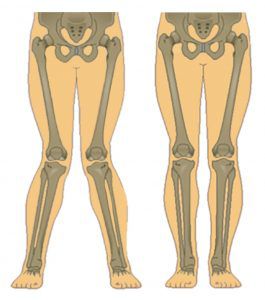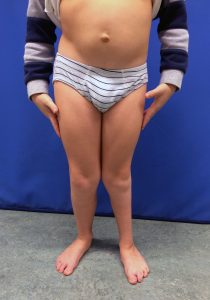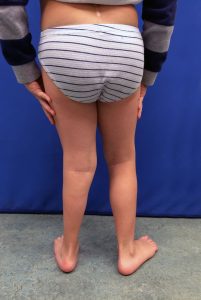Knock Knees
What are knock knees?
Knock Knees, also known as Genu Valgum from Latin, is a condition in which child’s knees point inwards and nearly come together when he stands with the ankles apart.

Usually a baby up to 18 months may have a natural outward-turning, that becomes neutral within 24 months. When the child is 2 to 5 years old he may have an natural inward-turning.
If the condition appear later, when the child is 6 or older, it could be a symptom of an underlying bone disease.
Knock knees causes


As bow legged, knocked knees can be considered a normal stage of development in most growing children.
In most cases they resolve itself within the age of 7, without treatment.
But if the condition appears when the child is older than 6 there may be an underlying bone disease such as osteomalacia or rickets.
Also obesity may cause knock knees.
Knock Knee Diagnosis
The diagnosis can be made during a physical examination by an orthopedic surgeon.
X-rays are usually recommended only if the child is older than the usual age range to avoid unnecessary radiation.
Knock Knees Treatment
Observation is the first option, since most cases of knock knees resolves on their own (99%).
After the age of 7 or 8 if knock knees are severe and cause pain or difficulty in walking the pediatric orthopedic may recommend surgical or nonsurgical options.
Non Surgical option includes splints, night braces, orthopedic shoes.
Knock Knee Surgery
Surgery is very rare for this condition.
A procedure called “guided growth” may be suggested to stop the growth on the bent side of the bone with time straightening of the bone will happen progressively
Femoral osteotomy is another option in most severe cases or when growth is finished.
About Professor Portinaro’s experience
Prof. Portinaro in his long-standing experience performed around 3000 guided growth surgeries and 500 osteotomies.
